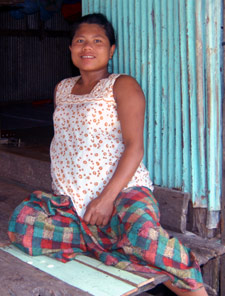Press Release
Survey Reveals Acute Need for Reproductive Health Care in Thailand's Migrant Communities Affected by Tsunami
30 August 2005
Press Release
30 August 2005
PHUKET, Thailand — Migrants living in areas affected by last year's tsunami need better access to maternal and child health services, family planning and information on preventing HIV infection, a UN-supported study has found.

In communities of people from Myanmar in Phang-nga and Ranong provinces, one in four mothers delivers without a skilled birth attendant, 55 per cent of all infants are not receiving immunization, only half of all married women are using contraception, and half the adults surveyed have incorrect knowledge about how HIV is spread. One third of the unmarried migrant men pay for sex without consistently using condoms.
These are among the findings of a survey of 700 migrants, conducted in June by Mahidol University’s Institute for Population and Social Research with funding from the UN Office for the Coordination of Humanitarian Affairs and UNFPA, the United Nations Population Fund. They were presented here at a seminar attended by health workers, local officials and community volunteers.
The results confirm the need for mobile health clinics and health education campaigns such as those being run in both migrant and Thai communities in Krabi, Phang-nga, Phuket and Ranong by the World Vision Foundation of Thailand and provincial public health offices with UNFPA support. World Vision employs Burmese-speaking medical staff to serve migrants and is training a cadre of health volunteers to do community outreach.
Migrant workers play essential roles in the region’s fishing and construction industries and on rubber plantations. Several migrant communities were hit hard by the 26 December tsunami. While many migrants returned to Myanmar immediately after the disaster, there has since been a steady influx of new workers.
Fewer than half the migrants studied were legally registered, and therefore entitled to the same affordable universal health care coverage as Thai citizens. Those not registered reportedly avoid public clinics and hospitals due to the cost and fear of deportation. Health workers say this is an important problem, as mobile clinics must refer seriously ill patients to hospitals.
Half of those surveyed were in their twenties; most of the women and about half the men were married, with unmarried men prevalent in fishing communities which have commercial sex sites. One fourth of the women had their first child before age 20.
UNFPA continues to assist World Vision and local Thai authorities in ensuring that post-tsunami community rehabilitation plans include reproductive health services and information. The Fund is also supporting an effort by the Thai Red Cross AIDS Research Centre to reduce the spread of HIV/AIDS and other sexually transmitted infections in the affected areas, by promoting safer sexual behaviours and social marketing of condoms.
***
UNFPA supports reproductive health and population programmes in 146 developing countries including Thailand. It has worked in all the countries affected by the tsunami to ensure that the special needs of women and youth are factored into the design and delivery of recovery and rehabilitation efforts.
Contact Information:
William A. Ryan
Tel.: +66 2 288 2446
Email: ryanw@unfpa.org